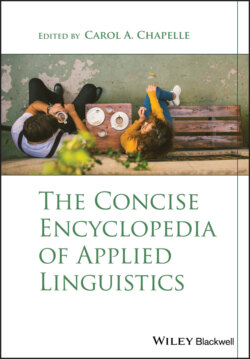Читать книгу The Concise Encyclopedia of Applied Linguistics - Carol A. Chapelle - Страница 94
Assessment of Integrated Skills
ОглавлениеLIA PLAKANS
Assessment of integrated skills refers to the use of test tasks that combine two or more language skills to simulate authentic language‐use situations. In such assessment, task demands aim to overlap and synthesize combinations of reading, writing, listening, and speaking. Although possibly more common in classroom assessments, such tasks are now included in larger‐scale tests, for example:
1 Internet‐Based Test of English as a Foreign Language (TOEFL iBT) from the Educational Testing Service is employed as a measure of English‐language use and comprehension in university classroom contexts for the purpose of admission into English‐speaking higher education programs. This test includes tasks that integrate writing with reading and listening as well as speaking tasks that include reading and listening.
2 Diplôme approfondi de langue française (DALF), managed by the Centre international d'études pédagogiques, is used as a French‐language proficiency measure for university study and employment. The high proficiency level assessment integrates multiple skills—reading, writing, listening, and speaking—with tasks such as summarization, discussion, and argumentation.
3 The College Board's Advanced Placement (AP) Spanish Examination in the United States is given to determine if college foreign‐language credit in Spanish can be granted to students completing high school. Writing tasks include an integrated essay based on reading two texts and listening to an audio file.
The view of skills as integrated contrasts with the long‐standing conceptualization of language as four skills, plus grammar and vocabulary, which has been a mainstay in language testing for some time (Carroll, 1961). The current trend of integrated skills assessment is focused on simulating the processes and performances demanded by academic contexts, where writing or speaking is tied to content that students have listened to or read. Thus, it has arisen from a practical view of language tests designed to readily provide scores that can be interpreted as a language ability needed to complete academic work. With this impetus, subsequent research sought to further define the construct of what this ability is and find evidence that integrated tasks tap into this construct. The outcome thus far, suggests that integrated assessment tasks tap into performance‐based skills of speaking or writing, general language knowledge of vocabulary and comprehension (Sawaki, Quinlan, & Lee, 2013), and ability to synthesize content and skills through discourse synthesis. Less certain is how the scores from these tasks can provide inferences about listening or reading, which is clearly required in the process of completing the tasks (Zhu, Li, Yu, Cheong, & Liao, 2016). Thus, while the depth and breadth of research on integrated skills tasks has grown significantly in the past decade, scholars express the need to continue the search to better define these tasks (Knoch & Sitajalabhorn, 2013), develop new innovative approaches to them (Plakans, Liao, & Wang, 2018), and establish reliable scoring that reflects the intended integrated language ability (Gebril, 2010; Gebril & Plakans, 2014).
